#computer programming courses for beginners
Text

Best vocational college for computer software classes
George Telegraph Training Institute is the best vocational college that appoints the best professionals in every field. These trainers teach students with profound experience and expertise to detangle their conceptual threads and fabricate their creative careers.
#basic computer programming courses#computer software certifications#computer software programming courses#programming certificate course#software and applications programmers course#computer programming certificate#computer programming courses#programmer certificate courses#computer programming courses for beginners#software engineering courses after 10th#computer programming courses after 12th
0 notes
Text

Computer Programming Courses For Beginners
Gyaan.com is one of the top online based learning institutes. We have made life easy for students by providing online classes. We also deliver computer programming courses for beginners. If any student is interested and wants to learn about computers, they can enroll in our institute.
0 notes
Text
What is ServiceNow |Introduction | User Interface| Application & Filter Navigation | Complete Course
youtube
ServiceNow is planned with intelligent systems to speed up the work process by providing solutions to amorphous work patterns. Each employee, customer, and machine in the enterprise is related to ServiceNow, allowing us to make requests on a single cloud platform. Various divisions working with the requests can assign, prioritize, correlate, get down to root cause issues, gain real‑time insights, and drive action. This workflow process helps the employees to work better, and this would eventually improve the service levels. ServiceNow provides cloud services for the entire enterprise. This module consists User Interface and Navigation. The Objective of this module is to make beginners learn how to navigate to applications and modules in ServiceNow, using the Application and Filter Navigators. To Create views and filters for a table list and to update record using online editing.
#introduction#ServiceNow#Courses#Free Training#Tutorials#Programming#Data Structure#Algorithms#Computer Science#Tips#Demos#ServiceNow Fundamentals#What is service now#Service now tutorial for beginners#Servicenow Online Tutorial#Service now introduction#Youtube
0 notes
Text
It is crucial to learn Python from the best resources available. books are one of the best resources to learn anything so we are going to check out the 5 best Python books for beginners. the episode of this podcast is dedicated to the top 5 Python books to build a strong foundation for beginners.
#best python book for beginners#python programming book#best book for python programming#python programming book for beginners#book for python programming#best book for python programming pdf#latest Python books#free Python books#Python Crash Course#Head First Python#Learn Python the Hard Way#Python Programming An Introduction to Computer Science#Automate the Boring Stuff with Python#best python book for beginners in India#SoundCloud
0 notes
Text
How to Grow Up
A guide on how to grow up. It was originally posted by @/friendliness but half the links were broken. So I took what links weren't broken and added other links and more things to know.
This is USA based resources
Personal
Reasons to Stay Alive – A Tumblr post of 116 reasons to stay alive by @/friendliness.
How to Get Better At Asking for Help – Website is Harvard Business Review. The article is “5 Ways to Get Better At Asking for Help” by Wayne Baker.
What to do if you Can’t Afford Therapy – Website is Psych Central and the article is by Steven Rowe.
How to Quit Smoking – “The 22 Best Ways to Quit Smoking” by Debra L. Gordon and David L. Katz M.D. from the Healthy Digest.
How to Legally Change your Name – Website is Forbes.
Wanna Learn Something New? – A Tumblr post made by @/hamletthedane with various new things to try from language learning to ballet.
Free Harvard Courses – Harvard University’s free online courses.
Getting a New Computer? – A quick and dirty comprehensive guide by WIRED on what to look for.
How to Sew – Website is Autodesk Indestructibles. The article is “How to Sew” by Jessyratfink. Having a small sewing kit (that you can pick up from nearly any craft store) is super handy and has saved my life and clothes.
What to Look For in Clothes A YouTube video by Alyssa Beltempo titled “How to Identify High Quality vs. Poor Quality Clothing | Slow Fashion”. Here’s a WikiHow [x] if a YouTube video isn’t your style.
Dealing with Executive Dysfunction – A Tumblr post made by @/compassionatereminders. It's a list to more links on how to deal with executive dysfunction.
Another List Like this One – A Tumblr post made by a now deactivated account. It's a list much like this one.
Home
What’s a mortgage? – Website is realtor.com and the page is called “What is a Mortgage? Home Loan Basics Explained” by Cathie Ericson.
First Apartment Checklist – A checklist PDF. Here’s another link to a Tumblr checklist [x]
What to Ask Landlords Before Renting? – “25 Questions To Ask a Landlord When Renting a Home” by Morgen Henderson.
What’s Renter’s Insurance? – Website is Forbes Advisor. The article is by Jason Metz and titled “How to Get Renters Insurance”.
Plant Care – A master list of how to care for plants made by @/difficults
Job
Time Management – Website is Entrepenuer and has 10 time management tips. One I personally recommend is keeping a physical calendar book on hand. I keep mine in my bag with a designated pen.
Finding the right job – Website is The Muse and it has 13 free career assessment tests.
Make a resume – Website is Resume Now. Many hirers look at your name, the middle of the page (where your experience list is) and skim the rest.
Job Interview Tips – Website is Linkedin. The article is titled “10 Job Interview Tips to Land The Career of Your Dreams” by Caren Merrick.
How to Write a Cover Letter – Website is The Writing Center. University of Winsconsin, Madison. It’s titled “Writing Cover Letters” and I can’t find the author.
Money
Couponing! – Website is Coupon Database :: Southern Savers. It has a list of mobile apps for coupons to places.
Call 211 for Help – the website leads to 211.org. It's anonymous and can help you get connected to food programs, paying bills and things like doctor appointments. Here’s a Tumblr post about it [x] by @/poessionisamyth
Groceries! – This is a Tumblr meme post, but scrolling through tags/reblogs/replies and there’s plenty of good tips. The post is by @/charlotten
What To Do if You Can’t Pay Your Bills – Website is Nolo. The article is “When You Can’t Pay Your Bills: Thiings To Know” that was updated by Amy Loftsgordon.
Are You Paying Too Much for Your Phone Bill? – An article by Beht Beverman titled “How Much is Too Much to Pay for a Cell Phone Bill?”.
54 Ways to Save Money – Website is America Saves.
How to Do Taxes – Website is Wiki-How.
The 70/20/10 Method – Website is Business Insider. The Article is “A Beginners Guide to the 70-20–10 Budgeting Method” by Paul Kim.
Side Hustle Ideas – Website is Forbes. “30 Side Hustle Ideas To Make Extra Money In 2024” by Krista Fabregas.
Emergency
Your Rights When a Cop Pulls you Over – Website is Business Insider. Cops are allowed to lie to you, and they will, so be careful.
Hotline List – The website is DoSomething.org. Depression/Suicide, domestic abuse, child abuse and runaway/homeless/and at-risk youth hotlines.
What to Keep in Your Car – Website is MentalFloss. I live in a snowy area that gets blizzards and bad ice. I keep blankets, water and other aids in my car as well as a knife and road flare. I also own a self jumping car battery and it has saved my ass more than once.
Heimlich Maneuver – A one minute video by the Mayo Clinic.
The Heimlich Maneuver on Yourself – A one minute video by The List Show TV.
What to Keep in Your Wallet – Website is PureWow. The article is by Rachel Bowie. Keep your drivers license, medical insurance card, and an emergency contact in your card. If you have a pet home alone make sure that you have a card detailing this. Free printable one here [x]
Traveling
Packing List – Website is Smarter Travel.
Traveling with Little to No Money – Website is Nomadic Matt.
How to Pack a Suitcase – Website is Real Simple. The article is by Thersa O’Rourke.
How to Apply for a Passport – Website is WikkiHow.
Making a Travel Budget – Website is Travel Made Simple. “How to Make a Travel Budget” by Ali Garland
#how to grow up#list#housing#living on your own#insurance#traveling#may update more and refine over time
417 notes
·
View notes
Note
Hiii! So sorry to bother you but im a total newbie when it comes to digital art and animatics so I was wondering a few things if you don't mind.
1. What programs du you use? Like FlipaClip or Adobe Animate ect..
2. Do you draw with a tablet? On a computer with a mouse, or an Ipad? (Or something else)
3. Any tips for someone drawing digitally/making an animatic for the first time?
Again so sorry if someone already asked this or if you dont understand my english😭 (im not native lol)
Hi, so...I will try to answer you and not to guide you in the wrong direction 😂
So
1. I use Photoshop, for drawing and for animation. BUT I recommend you to use a Clip Studio Paint for animation because it's more suitable for that or smth closer to this. I do it in Photoshop because this is the only app I have for this and I already got used to it too much.
Of course, animation can be done in general through a variety of crutches, for example, when I had problems with the program, I saved the frames separately and put them in the video editor, but I usually did that with small animations
2. I draw on a tablet, a very simple one - One by Wacom CTL - 672 (it's without screen), I believe it's not a bad one for a beginner. I have enough of it to work with, the only thing I would like is a higher level of clicks, so you can find it in about the same price range and with a larger range of clicks if you want.
3.If you want to do animation, it's better to ask other people, I can give you not very good tips, because I started doing animation as a hobby and all I know is all the watching from anime/cartoons.
I can only suggest that you watch animation lessons on YouTube..and to train your eyesight. Start with some simple animation maybe.. my friend sent me one lesson from one artist - Howard Wimshurst, maybe you can find smth interesting there.
I'm sorry I'm not very good at giving advice to people. I'm basically self-taught in terms of drawing, so.. sorry if this is not helpful 😭
21 notes
·
View notes
Text
KinitoPET, Doki Doki Literature Club, Pony Island, and The Beginner's Guide: Some Autistic Gamer Thoughts
This is gonna be a long post and not exactly my usual kind of post but I hope some people like it anyways and are able to read the whole thing. I'm kinda just infodumping some thoughts but still.
I really like all of these game. I really like them. And I sort of relate to them in an unexpected way that I think most of them (with the exception of The Beginner's Guide) did not intend.
I think the link between the first two is easiest to explain so I'll start there.
KinitoPET and DDLC are both games about computer program, who has a singular, hard-coded purpose, becoming sentient and taking that purpose to an extreme. And similarly, they both harbor no actual malice as characters. And that's what I find so compelling. Kinito just wants to be the perfect best friend, and as a computer program, all he knows is gathering data, so that's the means by which he tries to do it. He doesn't fully understand what it is to be human. He doesn't have a grasp of free will, especially because he doesn't really have free will the way humans do, even though he's sentient. He's a computer program. He has a singular purpose. So he uses that purpose as a means to the end of being your best friend, which to him, means trapping you in a world he made just for you, using all the information you gave him. Computer programs don't die. They don't have a concept of "eternity" or "eternal torment." To him, "forever" is just a length of time.
And most of the same things can be said of Monika. She was designed to be a character in a dating sim. The singular purpose of dating sim characters is to fall in love with the player. That's what they do. So she does it, and she does it the very best she can. Of course, being sentient means that she can think outside the box. She wants to be the one you fall in love with and she uses her ability to manipulate her world and the people in it to try and make that happen. At their core, both of these character harbor no malice whatsoever. They don't want to hurt you, they don't hate you, it's the opposite. They love you, they just don't understand human love.
Think about these ideas led me to Pony Island, which once again has that same idea. An Entity(tm) in a computer wants to trap you in/at the computer forever. Only in this case it's The Actual Devil who wants you to playtest his silly pony game forever. The main difference being that The Devil does, in fact, have an understanding of human concepts like eternity and torment. In fact those concepts are kind of His Jam. He is the primary symbol used to convey those ideas. But even still, he never seems to show much malice for the player outside of situations where the player is actively breaking and manipulating the game and subverting his goals. And honestly I can understand that. If I gave my game to someone to playtest it and they refused to play it the way I'd intended, I would not be happy with them. Now, The Devil KNOWS that what he is doing is morally evil. Trapping souls in Gamer Purgatory and all. But in a way I feel like that's not so different from Kinito and Monika. Evil and eternity and torment are the only things he knows. Is that his fault? We have no way of knowing for certain that The Devil has ANY agency over his narrative. We don't know that he knows any other way to live(?) outside of trapping souls and tormenting them and all that jazz. In fact if you really wanna get meta with it in this game that's already a metagame about game development (which is a phrase that describes most, if not all, of Daniel Mullins' games), we can say for certain that The Devil DOES NOT have any agency, because he is a game character designed specifically to be...well...The Devil. He's evil and torments people eternally. That's what a The Devil does. He is NOT self-aware. If he were and he had a choice, maybe he'd just put pony island on itch.io and try to get feedback lol.
All of these games, at their core, are about a character that desperately wants some kind of human connection, but doesn't fully understand how to get that, and in turn makes the human they reach out to feel trapped and uncomfortable.
Do you know what game also does that? The Beginner's Guide.
Even thought it's a massive leap in form from the aforementioned examples, The Beginner's Guide has that same core concept. It's a game about games, in which someone doesn't understand how to be human.
When I first played The Beginner's Guide I totally missed the point. I thought it was just a game about games, and I thought the Davey walking us through it was The Real Devey and Coda was A Real Person who made weird games. I totally bought into the narratives that Davey was telling us the whole time instead of actually thinking for myself. I'm older now, though.
This at-least-somewhat-fictionalized version of Davey is the socially awkward weirdo. Coda is Just Some Guy who likes to make creative games. He's not A Developer(tm), he's a guy with a hobby. The Beginner's Guide is about Davey and how he sees himself in Coda's games but thinks that what he sees is Coda. And Davey never once talks to Coda about anything other than his games. Davey never once mentions having an actual, real conversation with this person that he's coming to consider a friend. Davey is a well-meaning but misguided person, and in some of his games, Coda is actively trying to tell Davey that in his own way. I think a good line that represents this is "If someone had just told me he just likes making prison games..." because it shows how Davey never even asked. There's countless examples of this. Like when Davey says Coda was "weirdly happy all the time" during a specific time period. He doesn't know why. Maybe Coda got a new job he's excited about, or a romantic partner, or maybe he started taking antidepressants, but the point is that Davey doesn't know, and he never asks Coda directly. He just makes wild assumptions about Coda by playing his games.
The Beginner's Guide is about someone who doesn't know how to socialize and is unaware of it. Someone who doesn't know how to foster a relationship with a human, and tries his best, but whose attempts are seen as uncomfortable. When you interpret some of Coda's games through this lens you can see it more clearly. That game about being on a stage in front of someone you admire, that's Davey talking to Coda and Being Weird(tm). And then, when he feels weird, he doesn't actually talk to Coda at all. He recedes back, feeling trapped and distant from someone he wants to be around. Observing only from a distance, through a bunch of prison bars.
Seems familiar.
Of course I could be pulling a Davey by forcing my own interpretation of the game onto you. And so the cycle continues. I encourage you to consider your own interpretation if you haven't ruined by mine, unable to see it any other way (whoops, there's Davey again).
To me, these games are about autism. I am an autistic woman, so of course that's the lens through which I see things. You don't have to be autistic to be socially awkward or misunderstand people. Again, you can have your own interpretation.
But I've felt these things. Being distant from someone, wanting to foster a relationship but not realizing that what it means to foster a relationship is sometimes entirely different from what I think it means. What "a relationship" even is can be totally different from what you expect. And I've been on both sides of this dynamic. Being approached by someone who Comes Off A Bit Too Strong or Too Weird or just Different. And I'm patient with those people. I know what it's like. I know they've been through it with less patient people, or people who only pretend to foster that connection out of pity or some other misguided attempt to make someone feel better. Obviously a relationship founded on pity and one-sided affection is doomed from the start. And in most of these games that "one side" is the other side of your computer screen.
Communicate with your friends, your partners, your family, whatever. If they don't know how to love you right, it's up to you to help them. If they're not receptive to that, that's when the responsibility is on them, at that point they knew the risks, and if they don't respect your boundaries you cut them off. If you don't know how to love someone else, it's up to you to ask them. Nobody wants to be Kinito, or Monika, or The Devil, or Davey, and nobody wants to be their players, either. Be patient with each other, and talk about it.
#original post#serious post#essay post#gaming#modern gaming#daniel mullins#daniel mullins games#pony island#kinitopet#kinito#the beginner's guide#davey wreden#ddlc#doki doki literature club#ddlc monika#games about games#metagames#meta games#autism#actually autistic#digital horror games#digital horror#internet horror#internet horror games#webcore horror#if you made it to the end of this post please send me an ask or a DM I'd really like to know what you thought of it
36 notes
·
View notes
Text
Quick-N'-Easy Icon Editing Set-up with Krita!
I'm sure there are already a few tutorials like this one out there, but hey, what can one more hurt?
What's this do?: Krita has features you can use so you can make quick edits to your icons all at once, and save them all out individually with the press of a button. It's a great time-saver, and gives you a lot of flexibility in your edits!
What you'll need:
Krita, a free and open-source painting / image editing program!
Icons!
Part 1: How to export your icons all at once.
( warning: long and image-heavy! Written with beginners in mind. )
Once you open Krita, you'll want to go to Window > Workspace > Animation on the uppermost bar to change the layout for what we'll need, here.
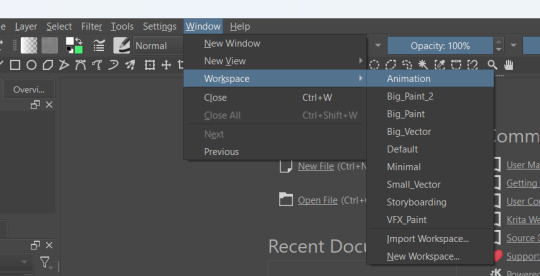
We're going to be using Krita's animation features to make iconing / icon-editing a little easier.

( as an extra note, hitting '1' on your keyboard will set Krita's zoom to the image's actual size, while '2' will have it fill the available space. Helpful for seeing how your icons will appear on the dash. )
Okay, let's get started! Make a new image ( File > New or press Ctrl + N ), set it to whatever dimensions you want ( I default to 100x100px ). Make a new layer ( Click the plus icon in the layers tab, or press ins ), and then put that layer in a group ( Right-click the layer and click group > quick group, or press Ctrl+G while its selected. )
With that grouped layer selected, Grab your icons, and click & drag them into Krita, onto the canvas ( the big empty grey space in the center ). When Krita prompts you, select 'insert many layers.' This will load in each image as its own layer. If you don't have the grouped layer selected, you'll have to select them all and put them back in the group. ( No big deal, just shift + click the first and last layers, and drag them where you need them. )
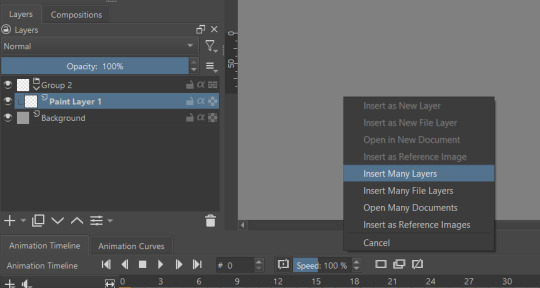
You can now delete your initial paint layer in the group, if you want. Otherwise it will make an 'empty' icon when we export.
Select that group, then go to Layer > Convert > Convert Group to Animated Layer on the top bar.
( This is only accessible through the top bar, not the menu that appears when you right-click on a group. I don't know why. )
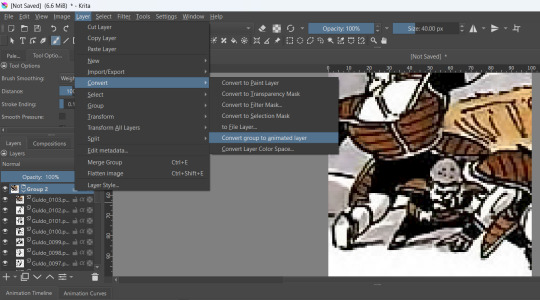
Congrats! Now all your icons are frames in an animation. Each cell on the timeline is a single icon. If you have a scroll wheel, you can scroll to quickly look through them all.
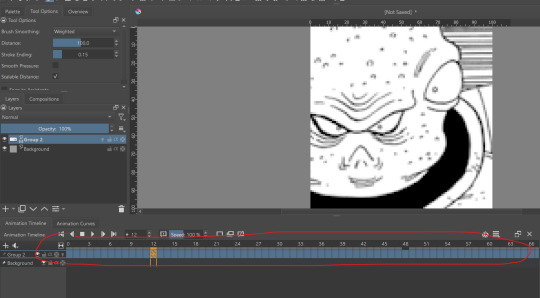
If you can't see all of your icons on the timeline, click the three bars here and set 'clip end' to whatever number of icons you have ( or a little more, for extra wiggle room. )
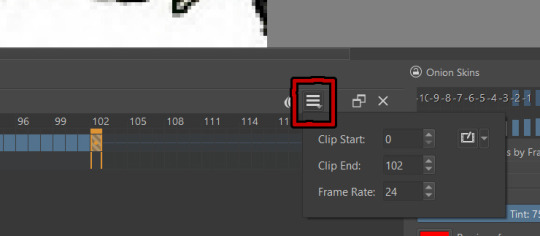
Find the last filled cell, right-click it and select 'set end time.'
When you're ready, hit File > Render animation.
You'll want to make sure you set it to export as an image sequence, and select where you want your icons to go on your computer. Give them a naming scheme.
Make sure you save before you export your icons, as I've had Krita crash while exporting a large number of icons all at once.
( If it does this to you, just try again. Worst comes to worst, you can export by setting the first frames and last frames to smaller chunks instead of all at once. )
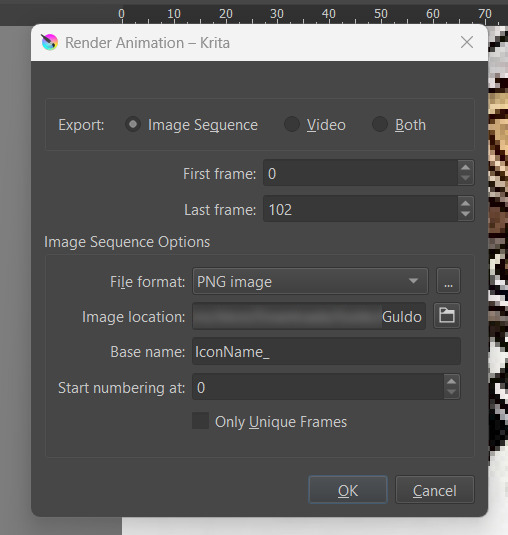
Hit OK and voila! No more saving icons out one-by-one!
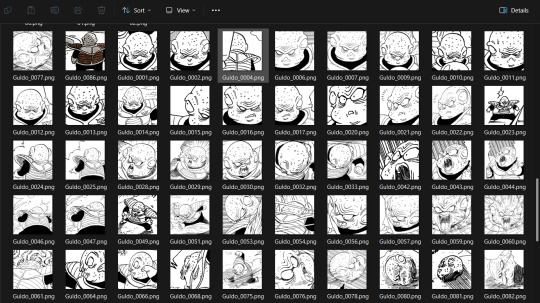
Of course, we haven't done any editing yet, so this is all redundant unless you're saving out your own freshly-cropped icons. Let's move onto the fun part:
Part 2: Editing
Right-click your new group layer and hit add > filter mask. Choose any you want- for demonstration purposes, I'll be using my favorite: gradient map.
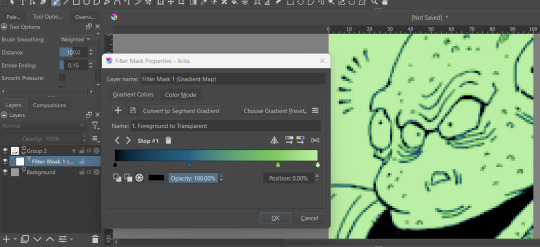
This will put that filter over all frames in that animation layer, meaning you won't have to repeat your edits per icon.
If you want to edit your filter mask after you click off, just right-click it in the layer tab and select 'properties.' It will bring the initial prompt up again for you to adjust.
You can add as many filter masks as you want! The order the layers are in does matter, though, so keep that in mind.
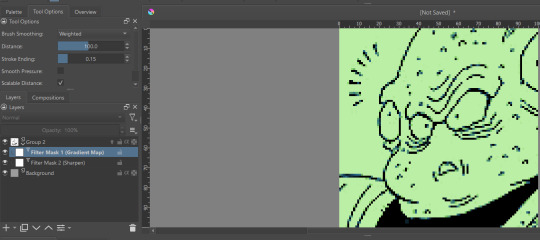
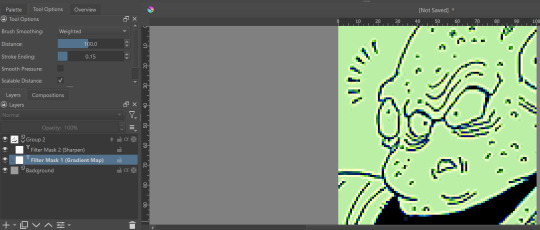
If you want to add frames, banners, name tags, symbols etc, you can do that on layers over or under that animation layer! They'll stay consistent across the 'animation' unless you add new frames to them on the timeline.
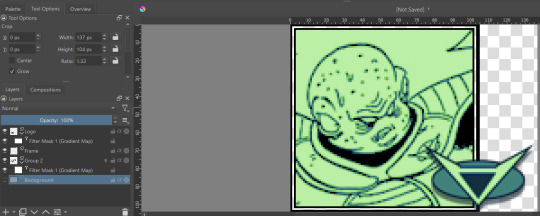
If you want to edit your icons again, just do so, and re-export! If the naming scheme and numbers are the same, Krita will automatically overwrite the old files. But watch out; if you're trying to save new icons, make sure you start numbering at a higher number than your last icon, or change the base name.
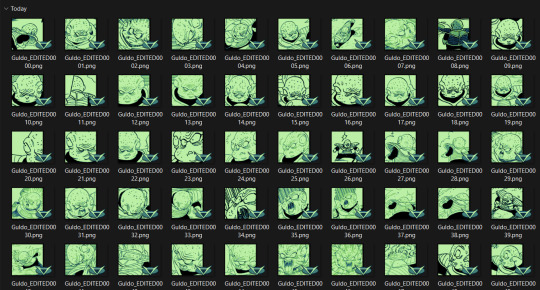
Happy iconing!
#rp icons#rp icon tutorial#rp resource#rp tutorial#icon editing#icon edits#not icons#no clue what to tag this as...
20 notes
·
View notes
Photo

Which computer course should you do after your class 12?
Computer courses emphasize the underlying ideas behind computers. To become an expert in any given topic, you can use computer programming courses after 12th to learn about numerous computer software types.
https://www.georgetelegraph.com/which-computer-course-should-you-do-after-your-class-12.aspx
#computer programming courses after 12th#computer programming courses for beginners#computer programming courses#software and applications programmers course#computer software programming courses#basic computer programming courses#computer software training courses#computer programming training
0 notes
Note
Hello! Do you have any advice on getting into freelance coding or remote jobs in the field? I'm having trouble with my current endeavors of applications and my current customer service job isn't doing me well enough to want to stay, so I'm hoping for progress sooner rather than later. Anything helps, thank you!!
Hiya 🖤
Thanks for reaching out with your question about getting into freelance coding or remote jobs. Making a transition can be challenging, but with dedication and strategic steps, you can definitely progress in your career.
Firstly, consider specializing in a specific field of computer science rather than trying to learn everything. This will help you become an expert in a niche, making you more attractive to potential clients or employers.
The big thing to look at is (1) what specific job do you want? Don't know yet? That's the first thing you need to find out. (2) Found the job you want? Go to this website "roadmap.sh" and click the job title you want and look at the roadmap to become it. (3) Have an idea of what you need to learn? Now study :)
Here are some extra key pieces of advice:

Public Code Repositories
Showcase your coding skills by contributing to public repositories on platforms like GitHub, GitLab, or others. This allows potential employers to see your projects and assess your coding abilities.
Online Certifications
Earn certifications from reputable online courses like Freecodecamp, Codecademy, or SheCodes (if you're a woman). Displaying these certifications on your LinkedIn profile adds credibility for remote work or even freelance work because then clients will trust your skills more if it's back up with evidence (projects and/or certificates).
Links: "Massive List of Thousands of Free Certificates" / "The Udemy courses I use" / "FreeCodeCamp" / "Codecedemy" / "SheCodes" / "Udacity" / "Coursera" / "Google"
LinkedIn Profile
Revamp your LinkedIn profile to reflect your job title. Use a title that aligns with your dream job, and highlight your skills, certifications, and projects. You don't even need work experience OR do what a lot of my developer mates do have no work experience and set your "job" as a self-employed freelance developer... little cheat there~!
Links: "LinkedIn Career Explorer" / "Tips for speaking to/reaching out to Recruiter" / "Tips for Landing Your First Entry-Level Developer Job" / "Career Services for Web Development" / "The Talent Cloud Community: Careers Workshop"
Volunteering
Help someone out with a project for their business or whatever. For example, I helped a guy I met in a programming discord server build his portfolio page for free, but I care more about the experience. Search online for volunteer jobs with your dream job title e.g. Volunteer App Develope, but in your country would be better. The experience you can you can add to your LinkedIn. the project you work on you can add to your resume/experience.
Link: "SkilledUp Life"
Networking
Connect with professionals in your field on LinkedIn, even if you don't know them personally. Growing your network can open up opportunities and expose you to valuable insights. Events in person or online, servers (I found volunteer opportunities here), forums, Twitter (I found some mates on there), Instagram (another place I found developer friends). Networking can even help with building group projects~!
Link: "Tips for speaking to/reaching out to Recruiter"
Project Building
Work on both small and big projects to demonstrate your capabilities. Highlight these projects on your resume and portfolio.
Links: "Building projects after learning a new concept advice" / "Tips from learning using multiple resources" / "Tips on learning programming with ChatGPT" / "Harvard University Free IT Courses" / "The Udemy courses I use" / "Free Programming Books" / "Coding Advice for beginners" / "800 free Computer Science classes"
Online Presence
Share your learning progress and projects on various platforms like Tumblr, Twitter, Instagram, LinkedIn, or YouTube. Employers often appreciate candidates who actively showcase their work and commitment to learning. I made a post for Tumblr coding blogs:
Link: "Codeblr Blog Advice: 8 Blog Coding Post Ideas"
Good luck!!
#my asks#programming#coding#studyblr#codeblr#progblr#studying#comp sci#programmer#student#study life#coding study
43 notes
·
View notes
Note
How would I go about learning about computer programming? Any advice for absolute beginners?
hm… well, i guess there's two primary ways you can start.
firstly, you could take a course. there are some online that are free to start with, like harvard's cs50, but i personally think the second option is a bit more fun and hands on.

the second option is to take some time to look up coding basics and experiment a bit through a small personal project. you can learn about the basic structure of computer programs and how programming languages work by watching youtube videos, or browsing stack overflow... and from there you can start small by making little programs that can do simple things. after that, it'll be a good foundation into coding more complex things.

good luck.
#ask-seb 🦇#i'd honestly recommend this advice as a computer science student myself. a mix of both of them should work well for beginners :)#for example harvard has cs50 (which is free but without certification)#and many universities and other sources post videos online regarding intro to coding classes#best of luck <3
35 notes
·
View notes
Text
ServiceNow | What is Update Sets | Compare , Revert and Merge Update Sets | Complete Course
ServiceNow is planned with intelligent systems to speed up the work process by providing solutions to amorphous work patterns. Each employee, customer, and machine in the enterprise is related to ServiceNow, allowing us to make requests on a single cloud platform. Various divisions working with the requests can assign, prioritize, correlate, get down to root cause issues, gain real‑time insights, and drive action. This workflow process helps the employees to work better, and this would eventually improve the service levels. ServiceNow provides cloud services for the entire enterprise.
youtube
#Introduction#ServiceNow#Courses#Free Training#Tutorials#Programming#Data Structure#Algorithms#Computer Science#Tips#Demos#ServiceNow Fundamentals#What is service now#Service now tutorial for beginners#Servicenow Online Tutorial#Service now introduction#navgation#UI16#Formview#Records#bigdata#programing#server#database#data science course#Youtube
0 notes
Text
#best python book for beginners#python programming book#best book for python programming#python programming book for beginners#book for python programming#best book for python programming pdf#latest Python books#free python books#Python Crash Course#Head First Python#Learn Python the Hard Way#Python Programming: An Introduction to Computer Science#Automate the Boring Stuff with Python#best python book for beginners in India
0 notes
Text
39 Best Websites to Find Free Textbooks, Research Papers, Study Guides, and Books
Whether you’ve just received a long list of textbooks you need for a specific uni class or are looking for a particular book/research paper for a high school project, books (and journal subscriptions) can be expensive.
The good news is that there are plenty of resources online where you can find free PDF versions of most written materials, starting with Atkinson & Hilgard’s Introduction to Psychology and ending with Shakespeare’s Macbeth.
Note that although some of the websites below provide access to copyright-free texts only, or texts that publishers/authors have agreed to share freely, others have been accused of internet privacy.
However, many people see open access practices as morally acceptable, especially considering the unsustainable prices of academic textbooks and papers.
To quote a recent paper on the topic:
"Since shadow libraries are a product of the cooperation between scholars, who contribute texts and other resources (such as donations, volunteer work, etc.), shadow libraries represent a ‘bottom-up’, radical approach to open access: a physical approximation of the Platonic ideal of knowledge sharing that would exist if there were no legal, economic, or institutional barriers to the circulation of scholarly knowledge."
Free Textbooks
Library Genesis
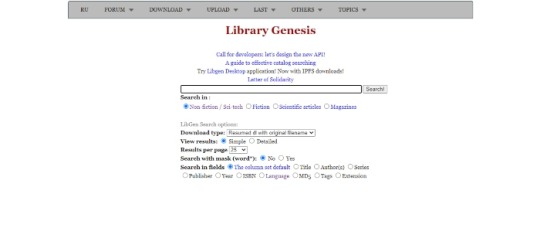
Library Genesis, or Libgen for short, is a shadow online library website where college students can find academic books (including those that are hard to find/very expensive) and scholarly journal articles.
The site also hosts general-interest books, audiobooks, comics, magazines, and images.
Z-Library
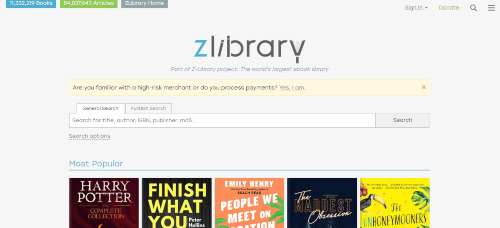
Z-Library is another shadow library website that hosts college textbooks, scholarly journal articles, and general-interest books. It calls itself “the world’s largest e-book library.” It mirrors Library Genesis.
The front page also features some of the most popular books at the time. When we viewed it, these included “Thinking Fast and Slow” by Daniel Kahneman, The Book Thief by Markus Zusak, and Harry Potter the Complete Collection by J. K. Rowling.
You can also use the right-hand navigation menu to see the books that have been added most recently, as well as sort through books based on category.
Use the Book Request option if you can’t find a book you’re looking for. There’s no guarantee your book will be added, but community members look at requests to see what books to upload (you can also upload books).
PDF Drive
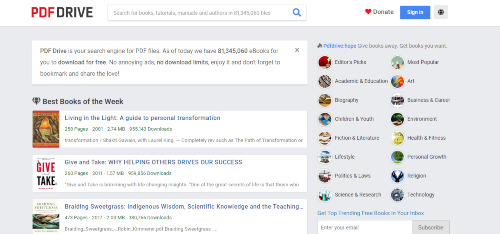
PDF Drive is an online library with a ton of free ebooks and PDF textbooks in various categories, including academic & education (but also lifestyle, personal growth, art, linguistics, etc.)
ForCoder.su

Forcoder.su has lots of online textbooks on programming. It also provides free access to online courses, like Apache Kafka for beginners and object-oriented programming with Python. Currently, there are hundreds of free courses available.
Online Mathematics Textbooks
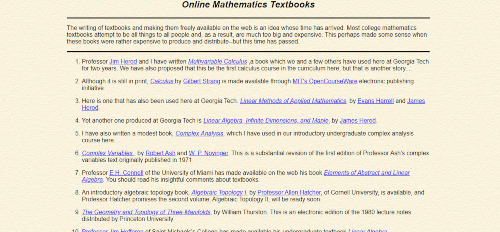
Online Mathematics Textbooks is your source for free digital textbooks on all things math. It’s just one page featuring 77 textbooks.
Tech Books for Free Download
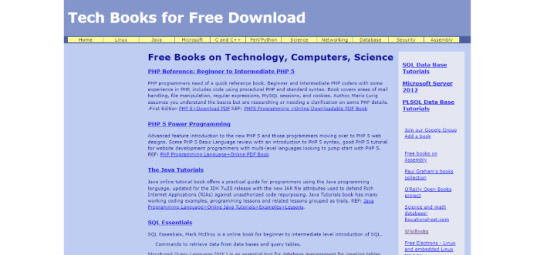
Tech Books for Free Download is where you’ll find free science and engineering books on topics ranging from data mining to general relativity.
There’s no way to search for books easily. However, the site is divided into books on Linux, Java, Microsoft, C and C++, Perl/Python, Science, Networking, Database, Security, and Assembly.
Free Tech Books
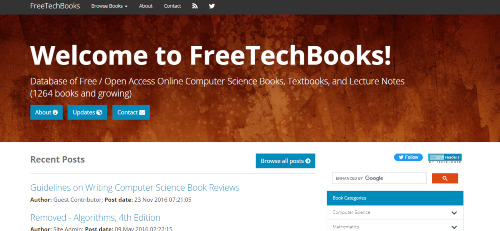
Free Tech Books is an open textbook library. It provides access to free computer science books and textbooks, plus lecture notes. All the books and lecture notes listed on this site are freely available on authors’ and/or publishers’ sites.
You can browse books by category (computer science, mathematics, supporting fields, operating system, programming/scripting, miscellaneous), author, publisher, or license.
Directory of Open Access Books
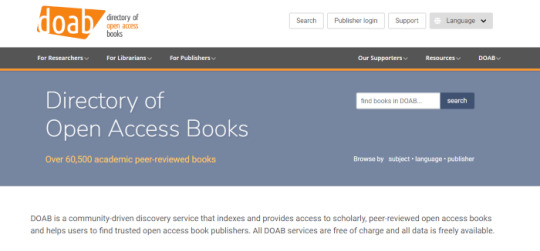
Directory of Open Access Books (DOAB) is a website that indexes and provides access to academic, peer-reviewed open-access books. All disciplines are covered, but there’s a particular emphasis on humanities, social sciences, and law.
Ubiquity Press

Ubiquity Press has been an open-access publisher of academic, peer-reviewed books and journals since 2012. It was founded by University of College London (UCL) researchers.
Research Papers
Sci-Hub
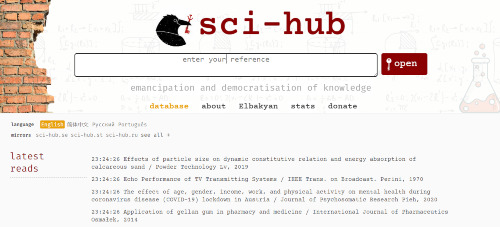
Sci-hub has the most expansive collection of research papers. Its mission is to “remove all barriers in the way of science.”
Directory of Open Access Journals
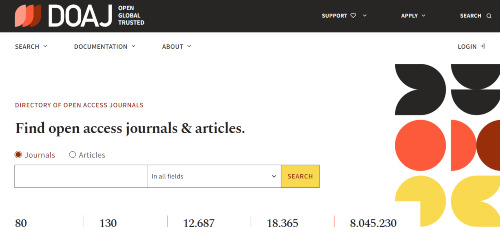
Directory of Open Access Journals (DOAJ) is an online directory of open-access, peer-reviewed research journals covering humanities, social sciences, technology, science, medicine, and art.
The directory indexes journals from different countries and languages. DOAJ is supported financially by publishers, libraries, and other organizations.
Wiley Open Access

Wiley Open Access provides peer-reviewed open-access journals across topics like biochemistry, economics, sociology, mathematics, and law.
SpringerOpen
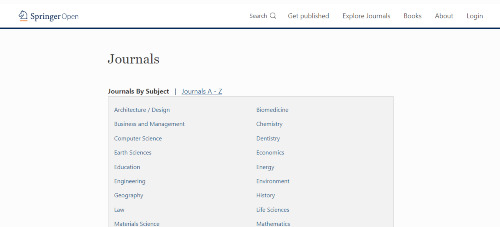
SpringerOpen publishes open-access journals across a wide range of areas, mainly STEM.
Elsevier
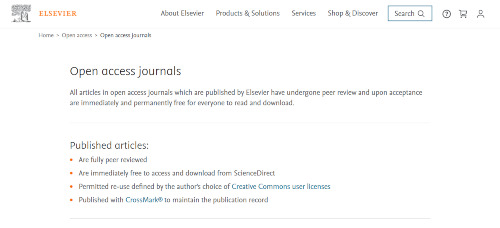
Elsevier publishes open-access, peer-reviewed journals. You can search for journals by title, keyword, or subject (dentistry, nursing, decision sciences, etc.)
Springer Link
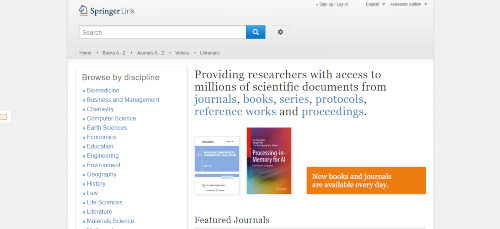
Springer Link provides access to ebooks, peer-reviewed journal articles, and other resources (mostly scientific).
BASE

BASE is a search engine for academic texts, including journals, digital collections, institutional repositories, etc. You can access about 60% of the indexed texts for free.
Study Guides
Bibliomania
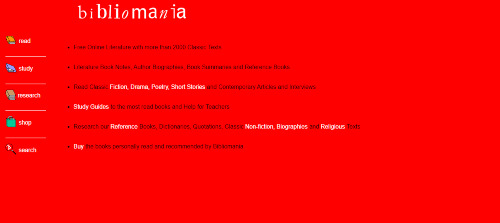
Bibliomania has study guides to the most-read books, like “A Hero of Our Time,” “Animal Farm,” and even Irish politics. It also has over 2,000 classic texts, book summaries, author biographies, and more.
Books
Open Library
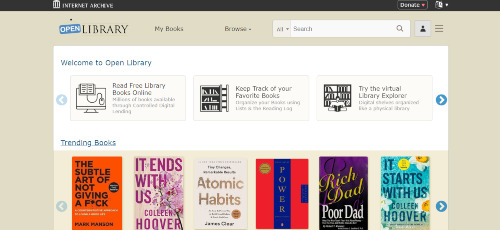
Open Library is an open library catalog of more than 3 million new and old books. The project was created by the nonprofit organization Internet Archive. It has also received partial funding from Kahle/Austin Foundation and the California State Library.
You can read old books without an account. However, for new books, you’ll need to set one up (it takes just a few minutes).
Internet Archive
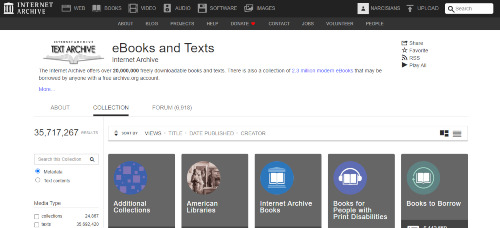
Internet Archive is a digital library of ebooks. It also has free movies, music, and software.
Project Gutenberg

Project Gutenberg is a famous site where you can find lots of free books. There are more than 60,000 books in its collection.
Standard Ebooks

Standard Ebooks take public domain texts and make them as nice as new books. They fix typographical errors and typos, create cool cover art, and format the text for e-readers like Kindle and iPad.
Planet eBook

Planet eBook is where you can download free PDF copies of classics like Franz Kafka’s The Metamorphosis, Fyodor Dostoyevsky’s Crime and Punishment, and Joseph Conrad’s Heart of Darkness.
What really makes Planet eBook stand out is its UX. It’s one of those rare sites that are super easy to navigate and actually look good (aesthetically speaking).
The Ultimate Book Search Engine

The Ultimate Book Search Engine is an ebook search engine that includes 350 open directory sites that relate to ebooks. It was created by the Reddit user u/NotoriousYEG.
Classic Bookshelf
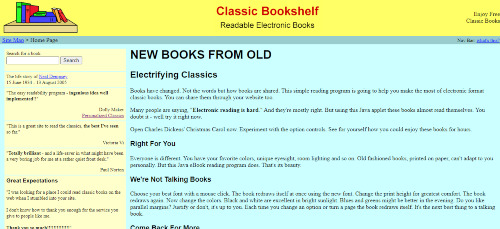
The Classic Bookshelf is a site where you’ll find lots of classic novels, everything from Charles Dickens and Leo Tolstoy.
Literature.org
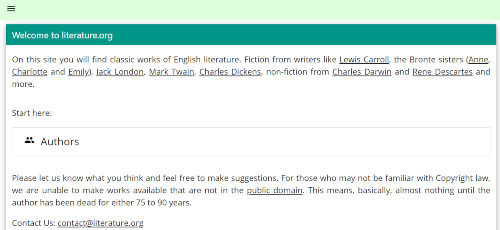
Literature.org features classic works of English literature, both fiction and non-fiction.
Bartleby

Bartleby is a site that features both fiction and nonfiction books.
Fiction.us

Fiction.us has a ton of books, including fiction, short stories, children's picture books, poetry, books on writing, and plays.
Classic Literature Library
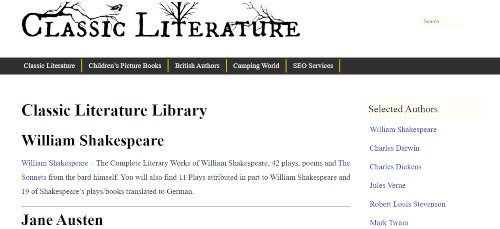
As the name suggests, Classic Literature Library is where you’ll find classic literature works.
Ideology.us
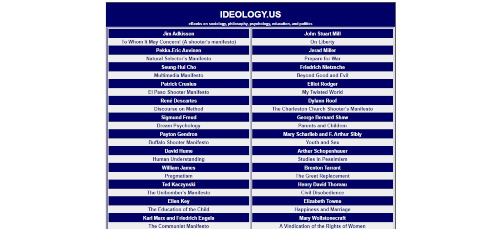
Ideology.us is a site that has ebooks on philosophy, psychology, sociology, politics, and education.
The Complete Works of William Shakespeare

The Complete Works of William Shakespeare is where you’ll find all of Shakespeare’s work. The site is run by The Tech, the largest and oldest newspaper by the Massachusetts Institute of Technology in Cambridge.
Read Books Online
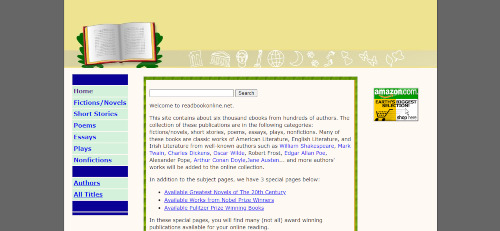
Read Books Online has around 6,000 ebooks, including novels, short stories, poems, essays, plays, and non-fiction.
Public Bookshelf
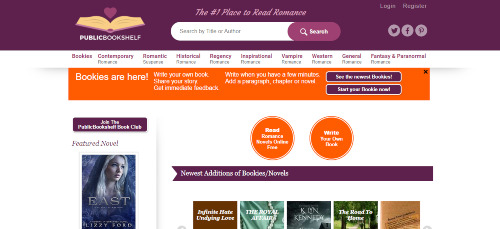
Public Bookshelf is a site dedicated to romance novels.
Categories of ebooks here include contemporary romance, romantic suspense, historical romance, regency romance, inspirational romance, vampire romance, western romance, general romance, and fantasy and paranormal romance.
The Perseus Project

The Perseus Project is a digital library created by Tufts University with books from Ancient Rome and Greece, published in original languages and English.
Chest of Books

Chest of Books has books on a ton of different subjects, including animals, finance, real estate, science, and travel.
The Literature Network
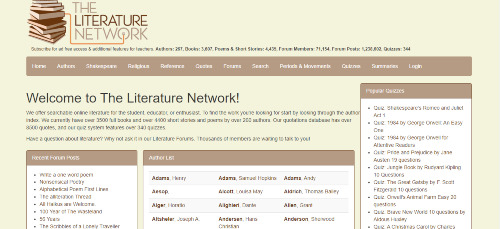
The Literature Network has books by authors like Anne Bronte, Lewis Carroll, and Lord George Gordon Byron. It also features forums, literature summaries, and quizzes.
The Online Books Page
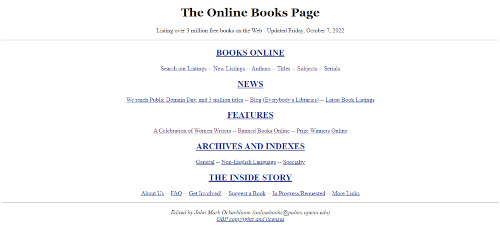
The Online Books Page is a site by the University of Pennsylvania that houses books in categories like philosophy, history, medicine, science, agriculture, music, anthropology, and more. The site also links to the following:
Banned Books Online: A directory of books that were once banned and links to places where you can read them in full.
A Celebration of Women Writers: A directory that lists online editions of literary works by women as well as resources about women writers.
Prize Winners Online: A directory of prize-winning books.
Many Books

Many Books is “your friendly neighborhood library.” It houses over 50,000 books in genres like romance, mystery, young adult, horror, and non-fiction. You can read books online or download them to your device.
Authorama

Authorama turns public domain books on sites like Google Books and Project Gutenberg into HTML format, making it easier to read them.
Audiobooks
Librivox
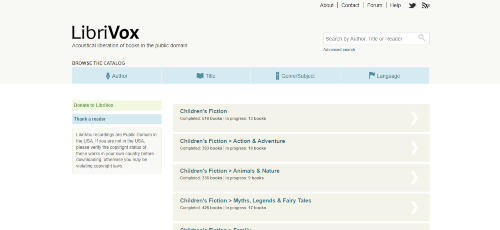
Librivox has free audiobooks that you can listen to from any device.
#adulthood#young adult#new adult#adulting#how to be an adult#adulting is hard#adulting 101#growing up#grown up#all grown up#responsible#the responsible one#self improvement#self#self sufficiency#self sufficient living#daily life#lifehacks#life improvement#life tips#life hacks#life#tips and tricks#tips#hacks#hack#reference#ref#free shit#college
499 notes
·
View notes
Note
Hi! I'm so sorry if this has been asked before, but I'm completely clueless on computers, but I want to learn about them. Any places you'd recommend starting for bare bones beginners? I'm also interested in early-mid 90's tech particularly too. I'm guessing I have to figure out the basics before I can move onto specific tech though, right?
You're really knowledgeable and nice so I figured I'd just ask. Any help at all would be appreciated. Thank you! :]
That's an excellent question, I don't think I've been asked it before in such a general sense. I was raised with the benefit of being immersed in computers regularly, so providing a solid answer may be a bit difficult since for the basics, I never had to think about it.
I had computer classes of various types throughout my school years. We learned how to use a mouse, typing, word processing, programming -- and that was all before middle school. We got proper typing, html, and general purpose computer science courses in middle and high school, and you can bet I took those too. I also have the benefit of a bachelors of science in computer science, so you'll forgive me if my answer sounds incredibly skewed with 30+ years of bias.
The biggest suggestion I can give you is simply to find a device and play with it. Whatever you can get your hands on, even if its not that old, as long as it's considered past its prime, and nobody will get upset of you accidentally break something (physically or in software). Learning about things with computers in general tends to have some degree of trial and error, be it programming, administrating, or whatever -- try, learn, and start over if things don't work out as expected the first time. Professionals do it all the time (I know I do, and nobody's fired me for it yet).
Some cast-off 90s or early 00's surplus office desktop computer running Windows would be a good start, just explore it and its settings. Start digging into folders, see what's installed, see what works and more importantly what doesn't work right. Try to find comparable software, and install it. Even the basics like old copies of Microsoft Office, or whatever.
I recommend looking through the available software on winworld as it's an excellent treasure trove of operating systems, applications, games, and other useful software of the time period. I'd link it directly, but tumblr hates links to external sites and will bury this post if I do. If you're a mac fan, and you can find an old G3 or Performa, there is the Macintosh Garden's repository of software, but I'm not the right person to ask about that.
Some of you might be like "oh, oh! Raspberry Pi! say Raspberry Pi!" but I can't really recommend those as a starting point, even if they are cheap for an older model. Those require a bit of setup, and even the most common linux can be obtuse as hell for newcomers if you don't have someone to guide you.
If you don't have real hardware to muck about with, emulation is also your friend. DOSBox was my weapon of choice for a long time, but I think other things like 86Box have supplanted it. I have the luxury of the real hardware in most cases, so I haven't emulated much in the past decade. Tech Tangents on youtube has a new video explaining the subject well, I highly recommend it. There are plenty of other methods too, but most are far more sophisticated to get started with, if you ask me.
For getting a glimpse into the world of the 90s tech, if you haven't already discovered LGR on youtube, I've been watching his content for well over a decade now. He covers both the common and esoteric, both hardware and software, and is pretty honest about the whole thing, rather than caricaturish in his presentation style. It might be a good jumping off point to find proverbial rabbits to chase.
I guess the trick is to a find a specific thing you're really interested in, and then start following that thread, researching on wikipedia and finding old enthusiast websites to read through. I'm sure there are a few good books on more general history of 90s computing and the coming internet, but I'm not an avid reader of the genre. Flipping through tech magazines of the era (PC Magazine comes to mind, check archive dot org for that) can provide a good historical perspective. Watching old episodes of the Computer Chronicles (youtube or archive dot org) can provide this too, but it also had demonstrations and explanations of the emerging technologies as they happened.
There are so many approaches here, I'm sure I've missed some good suggestions though. I also realized I waffle a bit between the modern and vintage, but I find many computing troubleshooting skillsets transcend eras. What works now can apply to 10, 20, 30, or sometimes even 40+ years ago, because it's all about mindset of "this computer/program is dumb, and only follows the instructions its given" . Sometimes those instructions are poorly thought out on the part of the folks who designed them. And those failures are not necessarily your fault, so you gotta push through until you figure out how to do the thing you're trying to do. Reading the documentation you can find will only take you so far, sometimes things are just dumb, and experimentation (and failures) will teach you so much more about the hard and fast rules of computers than anything else. I'm rambling at this point...
So, let's throw the question to the crowd, and ask a few other folks in the Retrotech Crew.
@ms-dos5 @virescent-phosphor @teckheck @jhavard @techav @regretsretrotech @airconditionedcomputingnightmare @aperture-in-the-multiverse -- anything big I missed?
18 notes
·
View notes
Text
Some learning apps I've liked (in no patrticular order)
Renshuu (japanese): good lessons, a bit slow paced for me
Readibu (chinese reading app): free version is good, paid version includes full sentence audio and translations I think which may be useful.
Pleco (chinese dictionary and reader app): top level app, get it now if you study chinese and use your phone at all. Its free version includes a huge great dictionary, and Clipboard Reader which has ALL the Reader features just that you have to copy and paste the chinese text in (their paid Reader you can upload epub txt files etc directly). Their paid features are nice because they are all 1 time fees: pay 5 dollars once and have the purchased item forever. I hate subscriptions so i love that this app does single purchase instead. I bought some graded readers on this, and expanded dictionaries. Its Dictate Text text to speech feature is nice in the Reader/Clipboard reader because it highlights the word as it reads and shows translation, making it easy to follow along.
Duoreader: a free basic app, has a few parallel language books for many languuages. It includes text to speech audio and click word translation. Excellent for free reading with parallel text set up.
Smart Book by Kursx (also under the name Parallel Translation of books by kursx on the app store): it uses mtl, but you can search for books or import books, and it will show sentence translations or make an entire parallel text for you, it also has click translations, word saving, progress information (which is motivating to me), and text to speech read aloud function. Its currently what i use the most for reading. Trahslations are as good as Lingq or Google Translate so NOT always reliable but useable and the sentence translation helps for figuring out grammar. But Pleco and Readibu have BETTER translations. For chinese this app is good, for japanese its useable if youre upper beginner but if you dont know basic grammar and particles then the japanese individual word translations are often wrong and unreliable - sentence long translations are useable though.
Tofugu: good hanzi study app.
Anki: great app especially if you import decks made by people around the internet. I look up decks by going to a search engine and typing in something like "4000 hanzi mnemonics anki deck" or "common chinese words in sentences anki deck." I have recommended some anki decks I've used on this blog. A tip about anki: their website works fine in mobile browsers, you do not have to pay for any app to use anki on your phone, you can just use the site if you'd prefer. For initial uploads of flashcard decks created by other users, you will need to install anki on a computer, then download the anki deck from the deck's page online, then put it into your computer anki program. After you do that, you can sync your computer anki to the website one. Then you can use anki either online or on the computer or on both. I use anki only on my phone mobile browser. It seems the main benefit of anki phone apps over using the internet mobile browser, is flashcards are easier to Make if you end up wanting to make your own anki flashcards on your phone.
Immersive Chinese: chinese lessons. I haven't used it much but I like the structure
Glossika: I specifically recommend getting the old cds, possibly through your library, or finding the mp3 files online. I think the audio files are easier if youre not good at focusing on consistently doing SRS flashcards, since spaced repetition study sentences are the new glossika model and require a monthly subscription. Plus side to the new model: most languages have around 6000 sentences where the old cd courses often had around 3000 sentences. Plus side to the old cds/mp3s: can be found in many libraries for free, and online, and if you do buy them theyre a one time cost. Excellent resource if you like audio review (i do), with common grammar and vocabulary taught. I like that even the 3000 word old courses will get you at least to upper beginner or lower intermediate, enough knowledge to start learning by reading or watching shows and looking words up, and enough words to have some conversations. Pimsleur is similar but tends to cover less vocabulary, so afterward you need to learn more words on your own before you can immerse and look up words to study.
Japaneseaudiolessons.com: a website with free japanese audio lessons, a free textbook, free notes. They also have nice kanji learning books with pre written mnemonics and sentence examples for sale.
Your local library: a lot of libraries have deals with language learning sites/apps, your specific library may provide some courses for free. In addition, apps Hoopla and Libby have a lot of courses and digital textbooks and audios you can check out. You can use those apps with a library card. If you are a college student, a lot of college ebook collections include MANY textbooks and independent study books for languages. Nearly every Tuttle book I got for studying Japanese and Chinese, I was able to check out the ebook version first using my college library and only bought those books because I ended up finding them so useful I wanted print copies. (For that matter, some under $20 dollar reference books I owe for teaching me hanzi and kanji: Tuttle Learning Chinese Characters: HSK Levels 1-3 - this book gave me a foundation in hanzi and was the easiest guide for learning hanzi for me and learning HOW to remember them. I found it more useful than Heisig's Remember the Kanji/Hanzi books by far, although they utilize a similat idea, and less effort to remember than Kodansha Kanji Learner's Guide - although I like that reference book as a reference. Runner up is Tuttle Learn Japanese Today: The Easy Way to Learn 400 Practical Kanji by Len Walsh. It was more basic than the hanzi book, less in depth, but a very approachable understandable and quick to learn kanji book to start out with when studying Japanese, that will not overwhelm you the way say Heisig or KKLG might. For hanzi I used my Learning Chinese Characters book for a few months, then an anki deck "hanzi 2000 mnemonics pinyin" while also just regularly looking up new words while reading graded readers then chinese show subtitles then webnovels, and making up my own mnemonics which got easier over time. For japanese, I followed up with a vocabulary deck as I found vocabulary easier to remember than isolated kanji, and kanji.koohi.com was a useful site for free user submitted mnemonics to remember kanji when I struggled to remember. Its also a good site for free flashcards and study of kanji generally.
ChinesePronunciationTrainer: a really simple free app. It's biggest usefulness is practicing pronunciation. You can record yourself trying to pronounce a sentence after hearing the chinese pronunciation, then play back your recorded attempt compared to the chinese pronunciation. The app makes shadowing easier to evaluate, so you can compare and notice if you're making pronunciation errors and work on them. It's also very simple low feature speaking practice.
LingoTube: free app, uses machine translation. If you want to watch youtube with dual subtitles, or click translations on subtitles, or instant replay/loop of dialogue lines, this is an app that can do that. Very useful for immersing with youtube videos like youtubers and shows on youtube.
Idiom app: it is orange with an i on the icon. Click skip for the "helm" offer when you first download it, helm is a paid add on for better translations and you may not want it right away. The core app is free (helm add on costs a subscription). This app is basically Lingq but free. Translation quality is the same, which appears to be google translate quality on Lingq and Idiom. So some errors, but useable especially as you hit upper beginner and above and can notice when you may want to reference a word in an external dictionary (like Pleco app for chinese, yomiwa app for japanese, etc).
Satori Reader: a graded reader app for japanese, absolutely amazing quality material. I recommend exploring the free content on the app. If you decide you'll use it a lot, or plan to get into a reading kick for a few months, it's worth getting a subscription for a while. I plan to get a subscription once I have the time to read japanese 1-2 hours a day for a few months. Satori Reader has tons of reading materials branching from approachable to an upper beginner (say you can read Yostuba manga a bit, or are in Genki 2, or know around 2000 words) to you're almost ready to read webnovels or regular japanese novels but the difficulty bump is just a Touch too steep. If you go through the various reading level material on the app, you shpuld be prepared to handle at least some japanese novels for natives once you can handle some of the higher reading level stuff on Satori Reader. In addition: the translations are done by professional translators with in depth notes on grammar points (incredibly useful and the best explanations on Japanese Graded Readers Ive used), fully narrated stories by real people, and many of the graded readers are designed to be enjoyable long reading material in their own right. There's also some multiple difficulty versions of reading material if you'd like to read an easier version before trying a more complex version of the same story. There is so much reading material on the app you can get significant practice and vocabulary/grammar improvement if you have time to read. I lnow a few people who got through a few hundred+ chapters on this app, and generally they went from N4 or N3 reading level to N2 or N1. Then they transitioned to reading novels for natives. As far as high quality well made well explained plentiful graded reading material for japanese, this is one of the best resources I've found. (The other 2 great graded readers I have are textbooks, one being a Tuttle Read Japanese book that goes from basics through to being able to read 2000 kanji, newspapers and documents, formal and informal, and is dry af to read but generally leaves you fairly prepared for japanese reading, and a more basic Beginning Japanese Reading book thats part of a 4 part textbook collection and absolutely drills the basic 500 most common kanji and many words, hiragana and katakana and many words in them, for 500 or so pages).
Microsoft Edge. I know, weird. Edge on computer and mobile internet browser has a Read Aloud tool. It is the best sounding text to speech Ive heard. This Read Aloud tool is also in Microsoft Word if you copy paste text into Word. I find going to sites in my target language, and using the Read Aloud tool, is a nice way to get audio in with my reading when I can't find an audiobook. The tool also highlights the word as it reads, helping you keep up with the reading, and for me it helps improve my reading speed. In addition, ANY web browser (and any phone/tablet Reader app like Kindle, Moonreader, Kybooks etc.) often has the ability to click or tap or highlight a word to look up the translation. So when reading on any of those internet browsers/Readers, you can look up words just like you would on Lingq but free.
Japanese.io: a site with japanese graded reading material, and tools like click translation and saving words.
https://www.sosekiproject.org/about.html If you like the author Soseki, this site is awesome. It features full audio of his works, full parallel text translation, and individual word translation.
43 notes
·
View notes